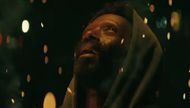Smoke provides profound insights into the nature of villains, for they do not always appear in ski masks or carry gasoline cans. At times, they are part of the system, share a dinner table with you, or look back at you in the mirror. The latest crime thriller from Apple TV+ opens with a wave of arson fires, but it becomes obvious that the deep-seated fire—and emotional destruction—is what remains to be seen.
Fronted by Taron Egerton as Dave Gudsen, an investigator with a pulse for fire patterns and a gutful of secrets, Smoke sets the stage for a classic manhunt. But instead of staying tethered to the familiar tropes of crime dramas, it lets the genre breathe—or rather, choke—on moral ambiguity.
Paired with the razor-sharp Michelle Calderon (Jurnee Smollett), Gudsen’s pursuit of the arsonists becomes less about catching criminals and more about confronting what the fire reveals in everyone involved. And that’s where the brilliance lies. Creator Dennis Lehane doesn’t point fingers—he hands you a lighter and dares you to ask why it’s being used.
As the investigation stretches into murky territory, so do the characters. With each layer peeled back, the show shifts its definition of villainy. In Smoke, guilt isn’t clean, justice isn’t pure, and sometimes the person you fear most isn’t hiding in the shadows—but buried in your assumptions.
Heroes in name only

At first glance, Dave and Michelle fit neatly into the well-worn mold of investigative duos: he’s the quietly tormented expert, she’s the grounded, no-nonsense detective. But the series refuses to let its leads live in archetype. Dave is less a hero than a walking ethical smokescreen, covering secrets that smolder just beneath his surface. His obsessive need to “catch the arsonist” starts feeling less like justice and more like penance—especially once we begin to see how the flames outside mirror the ones inside him.
While Michelle hasn’t exactly avoided morally gray areas, she has had her share too. Despite being somewhat effective, her collaboration with Dave is complicated. She has problems of her own—and they do not just involve the cold, calculating ways she inflicts psychological torture on people.
Interrogations reveal a larger story in which Michelle’s goals combine with her character. An outsmarted system, pretentious autobiographies, and love affairs bubble into one’s journeys and motives until equilibrium collapses with the essence being pursued. It’s not only a bad cop or good cop routine; it most often mutates into two heroes observing each other devolve to pieces in a variety of paced silences.
Fire is just the metaphor in Smoke

By midseason, the central question of the series isn’t “Who’s starting the fires?” but rather, “What keeps fueling them?” The arsonists may strike the match, but it’s the social systems that provide the kindling. Through supporting characters like Ntare Guma Mbaho Mwine’s Freddy—a fast-food worker desperate for meaning—the show critiques as he struggles within a broken system. Greg Kinnear’s weary police chief Harvey Englehart, the show critiques the very structures meant to keep communities safe.
Everyone’s burning from something: debt, trauma, powerlessness. And yet, Smoke never turns preachy. It’s not interested in condemning individuals as much as it is in indicting the conditions that allow evil to masquerade as duty. The “villain” becomes less a singular face and more a collective fog of complicity, cover-ups, and desperation. In this show, the flames aren’t the danger. It’s what’s left after they go out—the truths no one wants to admit were always there.
